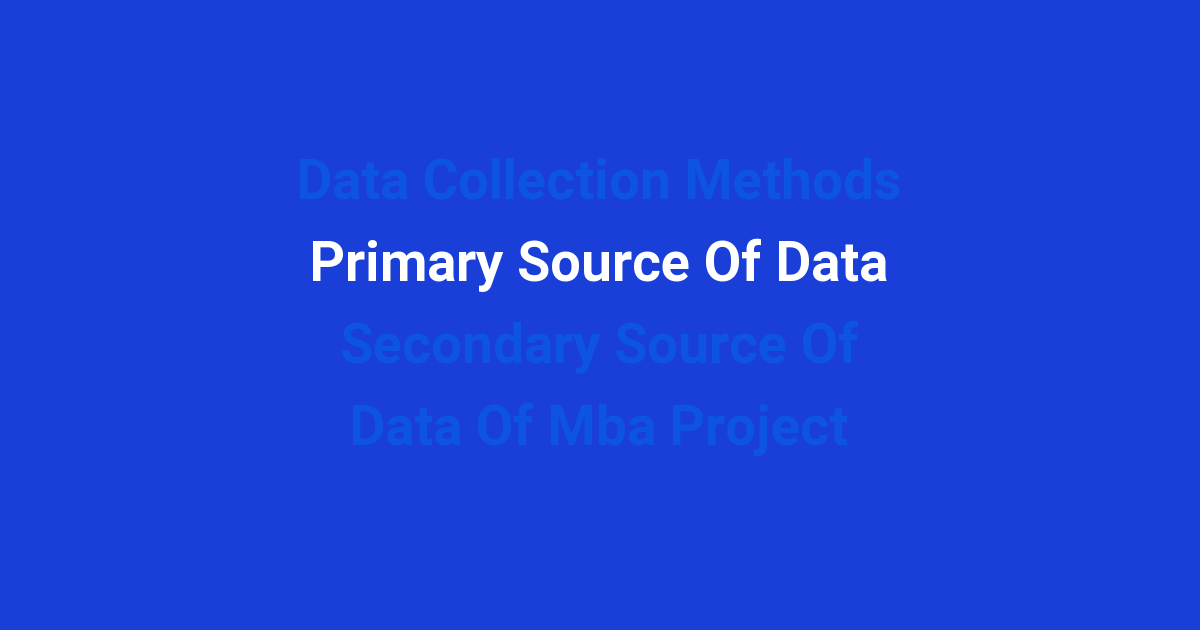Primary sources of data collection methods are the main sources of data for an MBA project, while secondary sources of data serve as supplemental sources of information.
Introduction
In the field of management, data collection is an essential part of any project. The success of a project depends on the accuracy and reliability of the data collected. In order to make informed decisions, managers need to have access to both primary and secondary sources of data.
Problem Statement
One of the challenges that managers face is determining the best way to collect data for their projects. There are several methods available, each with its own advantages and disadvantages. In this project, we will focus on the primary and secondary sources of data collection for MBA projects and evaluate their effectiveness in providing valuable insights for decision-making.
Existing System
The existing system of data collection for MBA projects typically involves gathering information from primary sources such as surveys, interviews, observations, and experiments. While these methods can provide valuable first-hand data, they are often time-consuming and expensive. In addition, the sample size may be small, leading to limited generalizability of the findings.
Disadvantages
Some of the disadvantages of relying solely on primary sources of data for MBA projects include:
1. Limited sample size: Surveys and interviews may not always reach a large enough sample to provide representative results.
2. Bias: Respondents may provide inaccurate or misleading information, leading to biased results.
3. Cost: Conducting surveys and interviews can be expensive, especially if a large sample size is needed.
4. Time-consuming: Collecting data from primary sources can take a significant amount of time and resources.
Proposed System
To address the limitations of the existing system, we propose incorporating secondary sources of data collection into MBA projects. Secondary sources include published articles, reports, and databases that have already been collected and analyzed by other researchers. By leveraging existing data, managers can save time and resources while still gaining valuable insights for decision-making.
Advantages
Some of the advantages of using secondary sources of data for MBA projects include:
1. Cost-effective: Secondary data is often readily available at little to no cost, saving resources for other project activities.
2. Time-saving: Researchers can quickly access and analyze existing data, reducing the time needed to collect information.
3. Large sample size: Secondary sources may provide data from a larger sample, allowing for more generalizable findings.
4. Reliability: Published reports and articles have typically undergone rigorous review processes, ensuring the quality of the data.
Features
The proposed system of data collection for MBA projects will involve a combination of primary and secondary sources. Researchers will begin by conducting a thorough review of existing literature and reports to gather relevant information on the topic of study. This will provide a foundation for understanding the current state of knowledge and identifying gaps in the literature.
Next, researchers will design a survey or interview protocol to collect primary data from stakeholders in the field. This primary data will complement the secondary sources and provide more nuanced insights into the research questions. By combining both types of data, researchers can ensure a comprehensive and multi-faceted analysis of the project.
Conclusion
In conclusion, the proposed system of data collection for MBA projects offers several advantages over the existing system. By incorporating secondary sources of data, researchers can access a larger sample size, save resources, and improve the reliability of their findings. This integrated approach to data collection will enhance the quality and relevance of MBA projects, leading to more informed decision-making and better outcomes for organizations.

